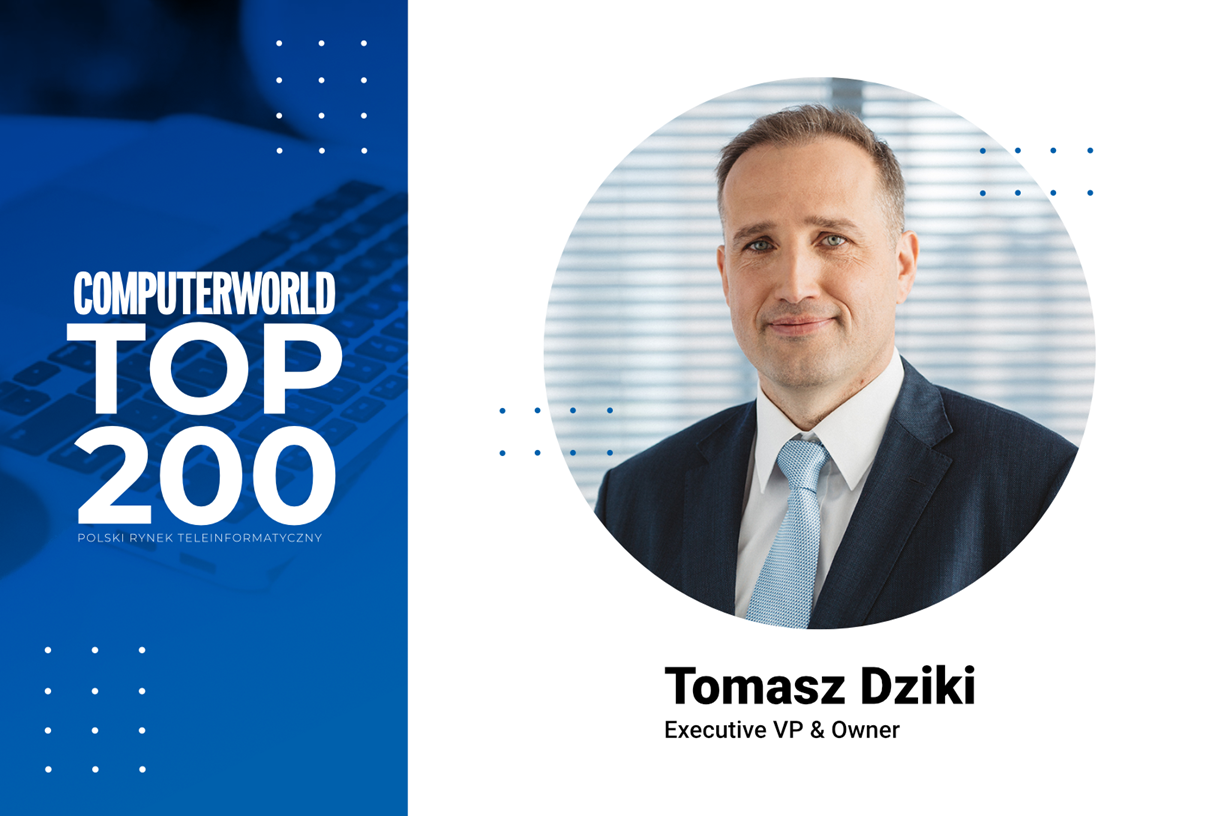The interview with Tomasz Dziki, Executive VP & Owner at Britenet, was conducted as part of this year's Computerworld TOP200 report, a comprehensive survey of the Polish ICT market. In it, he talked about, among other things, the beginnings of our company, the industries for which we provide services and Britenet's plans for the coming years.
Britenet is celebrating its 15th anniversary this year. What did the company's beginnings look like?
Just as all famous IT companies started in a garage, we started in an attic. The first steps in business were taken by a group of friends. I knew Tom Krajewski from college, and he in turn knew Michal from the puzzle championship. The idea was that since we were computer science students, we would look for clients directly and it would be to them, not to intermediaries, that we would offer our services. We found our first client - a pharmaceutical company. We were involved in developing the internal needs of companies. It was a time when Java was king. We also developed a CRM system, at that time still one done in-house, for the client's own needs. Then there was a second client, a third.... We were looking for more employees among colleagues from studies. When there were already 30 of us, we realized that we needed to create some kind of structure, to introduce a hierarchy in the company.
It's one thing to work with colleagues on your first project, another to manage a large company that no longer employs 30 people, but 800, as it does today. How did you learn to do this?
On mistakes. Because what works with 30 people does not work with 800. With each doubling of the number of employees, the structure must be rebuilt. Above a hundred people, a flat structure is no longer efficient, and you have to create new organizational units and cede responsibility lower and lower.
There are different management models. A group of colleagues suddenly faced a big challenge. How did you personally deal with it? Didn't micromanagement tempt you?
Of course he was tempted and continues to be tempted to this day. Each of the three of us believes that we are able to do something better and more efficiently than others. Learning to cede responsibility is a challenge, especially for young entrepreneurs. Each of those first 30 people was an employee bringing revenue to the company. Today, there are more and more employees who do not directly bring in revenue. Understanding this, too, required a shift in thinking as we built the company. I remember when we hired our first recruiter in 2008. The realization that we needed to cede this responsibility - that it was no longer us among our contacts who would search for our next employees - was one of many important steps along the way. Today, the HR department has more than 20 people.
Acquiring what customer was the most difficult? Entering what sector made it most difficult for you?
Each client is a separate story. The biggest challenge was probably entering the public sector. For a very long time we operated exclusively in the commercial sector. But the contract process in the public sector is very different from that in the private sector. There is such a thing as formal requirements and they are very rigid, not negotiable. Our first contract in the public sector was the Central Informatics Center. We went out to tender together with two other companies, which both padded the formal requirements. Encouraged by this first success, we took a more systemic approach, and today we have a whole team dedicated to the public sector, our clients include the former Ministry of Digitization, or the current Chancellery, the Ministry of Health, Finance. We provide our teams to these clients - about 140 of our employees are currently working for the NPRM.
How does the appetite for new technologies differ between the private and public sectors?
In the public sector it is now no less than in the commercial sector. This has certainly been influenced by the reality of the pandemic, although this was obviously happening before. We get used to various solutions very quickly and take them for granted, but they were not obvious until yesterday. For example, the fact that we can drive without a registration card, that we can have an ID card on our phone, and settle our taxes online. In contrast, the digitization pandemic in the public sector has obviously accelerated a great deal. And that appetite will grow.
Does the cloud help with that?
Just a few years ago, the cloud was just a buzz word. Today it is known that it is no longer just a fashionable buzzword, it is a reality. The discussion is no longer about whether to go to the cloud or not, but when and in what mode. As far as we are concerned, we have had our internal systems in the cloud for quite some time. However, when it comes to the cloud as a service that we sell, we offer practically every new solution to customers on the cloud. For example, if we're talking about CRM, it's Salesforce and it's an off-the-shelf cloud solution on a monthly subscription model for the number of users.
How did your overseas expansion come about?
Our move outside Poland began with work for companies, which were representatives of large foreign corporations for whom we made software. Then, through them, we came into contact with the cloud for the first time. And although at that time Poland stood apart from the world in terms of technological development, today most of our solutions are in no way inferior to what is happening abroad. While it used to take several years for news to reach us, today the flow of information is very fast. What's more, Polish small and medium-sized companies in the commercial sector are often much more technologically advanced than, for example, German companies, which have been around longer, so they use older solutions that they are often in no hurry to replace with new ones. The banking sector is a great example here - our Polish market is considered one of the better developed in the world.
And do you feel the sucking away of specialists from the Polish market, related to the global trend of competence shortage?
Someone setting up any business today cannot do without IT. It is no longer an option, it is a necessity. In the Polish market we have quite well educated specialists, all of Eastern Europe has a very good reputation in this regard in the world. So new recruitment is possible all the time, but we have set our sights on something else. We have programs like Step One - we hire people who are still in college and train them ourselves. It is very important to us that our employees want to stay with us as long as possible.
How do you achieve this goal?
We are an IT company and that is the crux of the matter. We work with specialists - that is, people who need to be given continuous development opportunities, provided with challenges at work and allowed to participate in interesting projects. Working with us in Lublin, for example, they can participate in projects created in New York or Las Vegas. If we have too many projects and we have to give up one of them, one of the criteria is: is it interesting for our employees? The effect of these measures we have taken is that in recent years we have won awards as the best place to work in IT, awarded nota bene by Computerworld.
15 years is a lot in the market, but the journey does not end at this anniversary. What other challenges, changes do you face?
Our primary goal for the near future is first: to establish ourselves in Poland. And this, of course, is related to the challenge already mentioned, namely how to remain in the new reality a company where people want to work. It is gratifying to see that our efforts are increasingly recognized. Britenet was recently ranked in the top 10 on the list of the top 100 IT service providers in 2021 in Poland by Clutch, a B2B platform that helps companies find the best providers. In addition, according to Clutch's analysis, based among other things on customer feedback, Britenet is the No. 1 company in Poland among managed services providers.
Second: we want to continue to expand abroad. Currently, 30% of our revenue comes from outside Poland. We hope that this share will grow.
Our ambition is to build a technologically strong company where specialists feel comfortable. And when it comes to specific technologies, we are investing very heavily in areas such as Business Intelligence, Salesforce, web portals, system integrations. These are areas where we primarily want to enrich our service.



